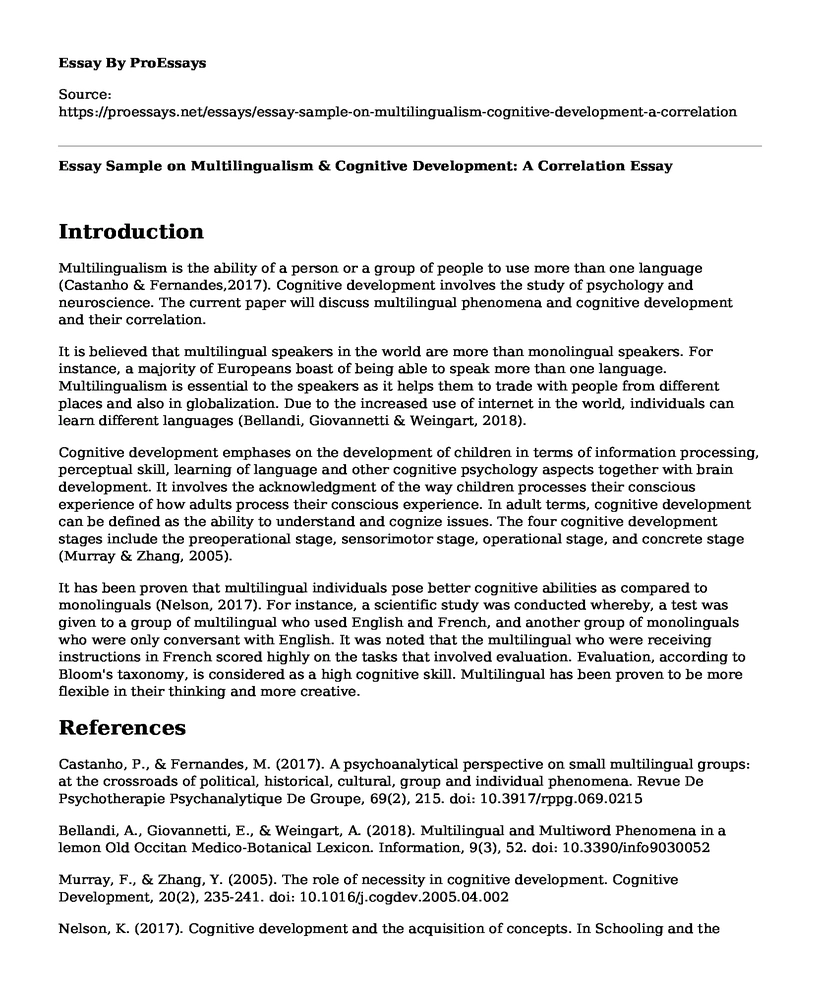Introduction
Multilingualism is the ability of a person or a group of people to use more than one language (Castanho & Fernandes,2017). Cognitive development involves the study of psychology and neuroscience. The current paper will discuss multilingual phenomena and cognitive development and their correlation.
It is believed that multilingual speakers in the world are more than monolingual speakers. For instance, a majority of Europeans boast of being able to speak more than one language. Multilingualism is essential to the speakers as it helps them to trade with people from different places and also in globalization. Due to the increased use of internet in the world, individuals can learn different languages (Bellandi, Giovannetti & Weingart, 2018).
Cognitive development emphases on the development of children in terms of information processing, perceptual skill, learning of language and other cognitive psychology aspects together with brain development. It involves the acknowledgment of the way children processes their conscious experience of how adults process their conscious experience. In adult terms, cognitive development can be defined as the ability to understand and cognize issues. The four cognitive development stages include the preoperational stage, sensorimotor stage, operational stage, and concrete stage (Murray & Zhang, 2005).
It has been proven that multilingual individuals pose better cognitive abilities as compared to monolinguals (Nelson, 2017). For instance, a scientific study was conducted whereby, a test was given to a group of multilingual who used English and French, and another group of monolinguals who were only conversant with English. It was noted that the multilingual who were receiving instructions in French scored highly on the tasks that involved evaluation. Evaluation, according to Bloom's taxonomy, is considered as a high cognitive skill. Multilingual has been proven to be more flexible in their thinking and more creative.
References
Castanho, P., & Fernandes, M. (2017). A psychoanalytical perspective on small multilingual groups: at the crossroads of political, historical, cultural, group and individual phenomena. Revue De Psychotherapie Psychanalytique De Groupe, 69(2), 215. doi: 10.3917/rppg.069.0215
Bellandi, A., Giovannetti, E., & Weingart, A. (2018). Multilingual and Multiword Phenomena in a lemon Old Occitan Medico-Botanical Lexicon. Information, 9(3), 52. doi: 10.3390/info9030052
Murray, F., & Zhang, Y. (2005). The role of necessity in cognitive development. Cognitive Development, 20(2), 235-241. doi: 10.1016/j.cogdev.2005.04.002
Nelson, K. (2017). Cognitive development and the acquisition of concepts. In Schooling and the acquisition of knowledge (pp. 215-239). Routledge.https://www.taylorfrancis.com/books/e/9781315271644/chapters/10.4324/9781315271644-17
Cite this page
Essay Sample on Multilingualism & Cognitive Development: A Correlation. (2023, Jan 28). Retrieved from https://proessays.net/essays/essay-sample-on-multilingualism-cognitive-development-a-correlation
If you are the original author of this essay and no longer wish to have it published on the ProEssays website, please click below to request its removal:
- Research Proposal on the Suicide Problem in the Black Lake Community
- Summary of Fine Motor Activities in Head Start and Kindergarten Classrooms
- My Interest in Master of Education at Minot State University Essay
- Paper Example on Chaining to Teach a Functional Self-Help Skill to a Child With Autism
- Article Review on Bench Mark for Cultural Competence
- Essay Sample on Overwhelming Stress: Causes and Effects
- Unlock Your Strengths: Build a Productive and Fulfilling Life







